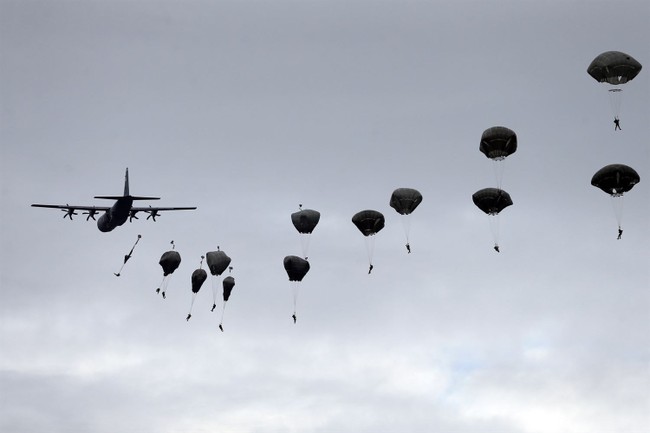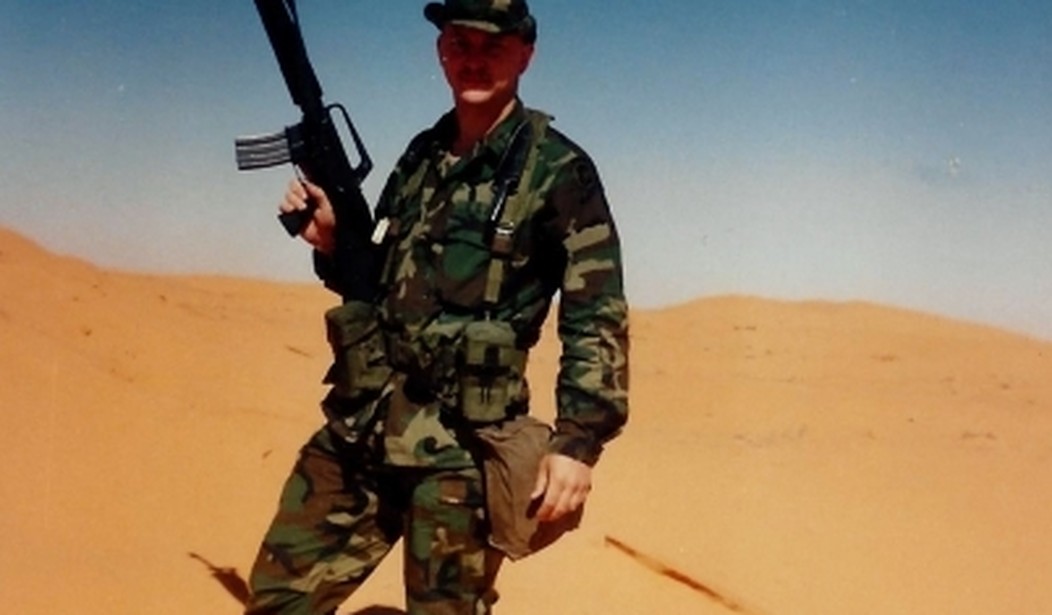In any Army unit, be it elite or pedestrian, active or reserve, some traditions, customs, and practices seem odd to those not in the know. I have it on good authority that the same applies to the Navy, Air Force, and Marines. Case in point: I had just taken over as leader of the headquarters platoon for a medical clearing company and was therefore in charge of the motor pool, food service, and supply. After I had been in the unit for a few weeks, a new kid reported in, fresh from his Advanced Individual Training (AIT.) One morning, as I was walking past the motor pool, I heard one of the non-commissioned officers (NCO) giving the kid an unusual order: "Go to the supply room and ask if they have any grid squares." (For non-military folks, a grid square is a geocoordinate marker used to locate navigation points on paper maps, so not something you could go fetch.)
I walked on. The key to being a good officer was knowing when to let your NCOs have a little fun; I had learned that from having been an NCO myself before the Army sucked out my good sense and made me an officer. And, sure, that's one of those traditions.
But some others are a little weirder.
One of those involves Airborne units (something I was never involved with; I remained a proud "Leg" throughout my career) and their first jump with a unit when they are told to load all their pockets with cherry pies.
Finally, the moment of truth arrives — you finally get to jump with your unit in the 82nd. Your superiors will recommend that you fill your cargo pockets with Hostess Cherry Pies first. They'll often say it's for some reason like, "in case you get hungry when you land" or whatever. Who are you to argue?
When your big moment finally comes and you take in the sights while falling gracefully, you'll hopefully have your PLFs burnt into the back of your mind as second nature. Everything will happen so fast that you'll forget those cherry pies in your pants. When you land, you'll squish all those pies and leave a nice red stain on your uniform.

New guys always get picked on. I suspect, as much as things have changed in the military, that hasn't.
See Related: DEI Strikes Again? U.S. Military Facing 'Worst-Ever' Recruiting Crisis, Notably Among White Recruits
Another involves callsigns, those famous nicknames we remember fondly from, among other things, the "Top Gun" movies. Many of those aren't nearly as cool as "Maverick," and you don't get to choose your own.
If you're looking for unique callsigns, those are in the aviation world, and they're typically less cool and more nonsensical. For example, if you eat a Pop-Tart one time in front of another pilot, your callsign is now forever "Pop-Tart." Good going, Pop-Tart. That's your callsign until the end of time.
As evidence of this, I can offer an F-16 driver I knew once, who after several beers one evening admitted to me his callsign since his Air Force Academy days was "Butthead." I never worked up the nerve to ask if he had ever had a wingman whose callsign was "Beavis."
See Related: The B-1 Bomber: Still a Formidable Arrow in America's Quiver
And then there's the old tradition of nicknames; some are based on something dumb you did at some point in your career. I got saddled with "Animal" based on an incident in an NCO club that involved an empty beer can and a broken wooden table. To this day, now and then I get a phone call from someone who shouts "Hey, Animal!" into the phone, and I know it is one of my old Army pals. Other nicknames are based on other things; I was in a unit once with a guy who had one of those long Eastern European names with no vowels; his name was so long they had to reduce the font size on his uniform name tape. Nobody could pronounce his name, so we called him "Eyechart." In that same unit, there was a guy from Hawaii who was about 5' 0", about as wide as he was tall, and one of the toughest guys I've ever met. His name was "Au" (pronounced "awe"). We called him "Ow."
Let's not forget the great soldier's tradition of scrounging. When I was deployed for Operation Desert Storm in 1990-91, my food service section favored us morning and evening with hot chow, said chow being bulk food packaged in big aluminum trays that were literally "heat and serve." About a month into that deployment, we had grown good and sick of the greenish A-pack eggs for breakfast every day. One morning, anticipating another meal of greenish scrambled eggs, soggy bacon, and toast as hard as flint, I entered the chow tent to see a hand-lettered sign: "FRESH EGGS TO ORDER."
I looked at my Mess Steward, the E-7 who ran the field kitchen. He was a short, bandy-legged gnome of a man with a sunny disposition, an ever-present grin, and great pride in his work. Behind him, two of the cooks were busily cracking and cooking, sure as hell, fresh eggs.
"Sergeant Nelson (not his real name)," I asked, "Where did you get fresh eggs?"
Bear in mind that we were at that time deployed in the middle of the desert in northern Saudi Arabia, near the King Khalid Military City airfield.
His grin grew wider. "Eltee," he said, "If you really want to know, I'll tell you."
I thought that over. "Nope. Just gimmie two, sunny-side up."
Later that morning, I was poring over paperwork in the Supply tent when the company commander came in. "Lieutenant Clark," he asked, "Where did the cooks get fresh eggs?"
"Sir," I said, "If you really want to know, I'll find out and tell you."
He thought that over. "No," he said at last. "Probably best I don't know. They were good, weren't they?"
"Sure were, sir."
I never did learn where the cooks got those eggs.
There is also the great old Army tradition at dining-ins and other such functions: The grog bowl.
The components of the drink are left to the imagination of those planning the event, but often have loose ties to the military unit’s history. The alcohol and other items that are poured into the grog have significance to that particular unit. Sometimes it is alcohol from a foreign country, where the unit served in World War II, or Kentucky bourbon from when the unit was stationed at Fort Campbell. Sometimes it is inedible objects like pantyhose, “for the women in the Army,” or even an old boot sock.
If you ever, for any insane reason, feel the need to experience a Richter-scale hangover, a traditional Army grog bowl is a good place to start.
Oh, and that customary Army shout that appears in the title of this piece: "Hoo-ah!" This is regularly yelled during physical training (PT) or when being briefed on a deployment or field exercise. While a lot of folks have heard this and many have shouted it, it's not commonly known that "Hoo-ah!" has a literal translation.
It means, "We think it's stupid, but we'll do it anyway."
Do you have any weird traditions, customs, or practices from your service days? The comments are yours!














